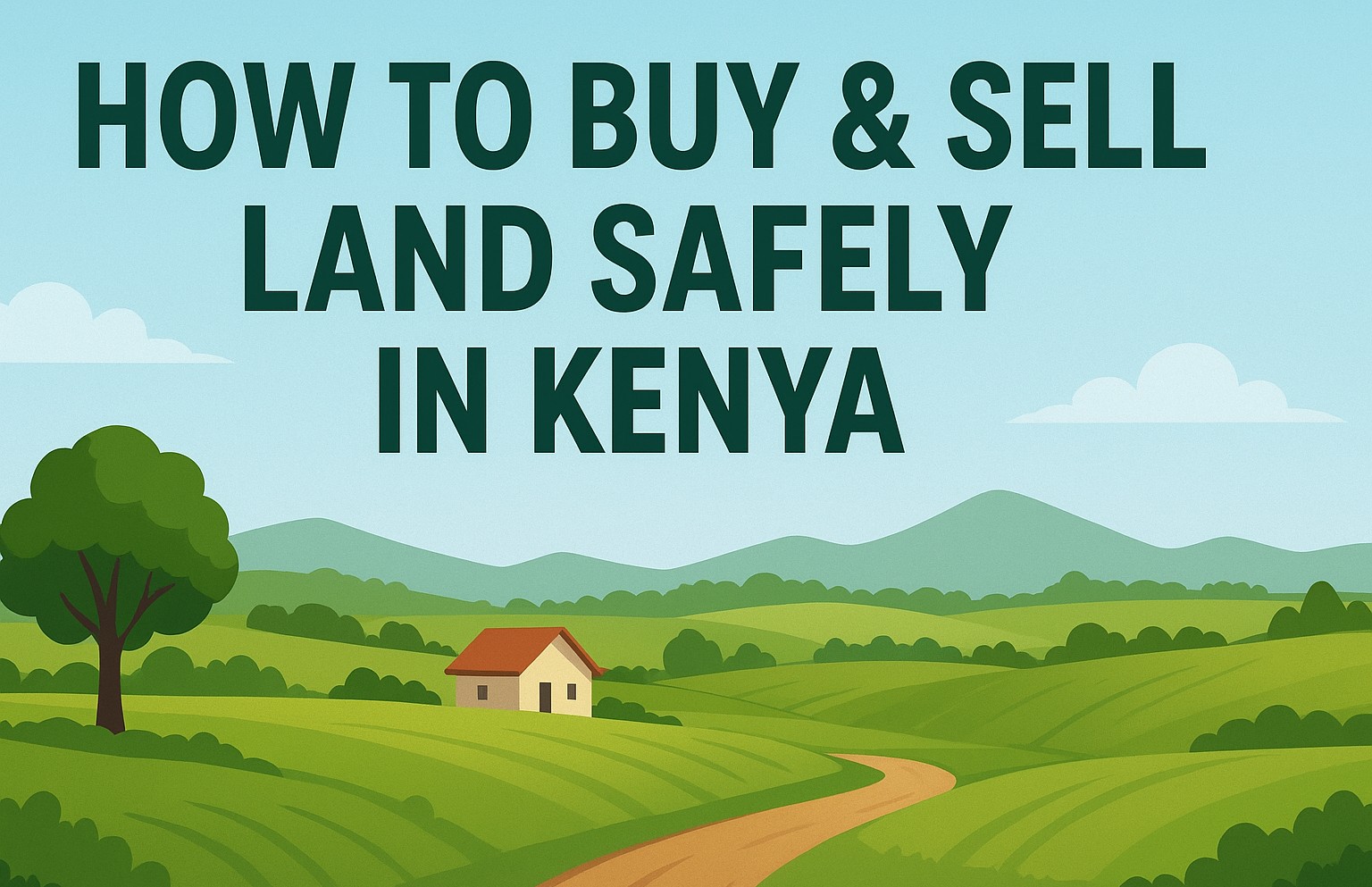

Titus Morebu
Author
How to Buy & Sell Land Safely in Kenya: Your Complete Guide 🏞️
Learn how to navigate land purchases and sales in Kenya step-by-step—due diligence, legal steps, safeguards & best practices for safe transactions.
Buying or selling land in Kenya can be a rewarding investment—but only when done correctly. Without proper checks, you risk falling into scams, disputes, or legal challenges. This guide gives you a step-by-step, practical roadmap to make the process safe, transparent, and legally secure.
Why Land Deals in Kenya Need Extra Caution ⚠️
- Prevalence of counterfeit title deeds or forged documents
- Unapproved subdivisions and boundary disputes
- Failure to obtain Land Control Board consent for agricultural land
- Unclear or missing documentation (e.g. spousal consent, land rates arrears)
- Payment risks (cash payments, lack of traceability)
Part I: How to Buy Land in Kenya Safely
1. Preliminary Research & Planning
Before committing, define what you want:
- Type of land: residential, agricultural, commercial, or industrial
- Location: proximity to roads, infrastructure, utilities, access rights
- Budget & costs: include legal fees, survey costs, stamp duty, registration
- Check zoning/regulations to ensure your intended use is allowed
2. Identifying a Legitimate Seller
Key safeguards include:
- Verify the seller’s identity (ID, KRA PIN) and match with title deed name
- Ask the seller for the original title deed (not just a photocopy)
- Check whether there are existing disputes, caveats, or encumbrances
3. Conduct a Comprehensive Land Search / Due Diligence
This is perhaps the most critical step to avoid fraud:
- Use Kenya’s land registry or eCitizen / Ardhisasa system to check title status
- Confirm there are no pending land rates, unpaid taxes, or encumbrances
- Verify that the seller listed in the registry is the same person you are dealing with
4. Obtain Survey Maps & Ground Verification
Ensure the plot boundaries are accurate and match documentation:
- Request official survey maps from the survey office or Ministry of Lands
- Hire a licensed surveyor to mark beacons, physically inspect the boundaries
- Visit the land with the seller and surveyor to confirm the terrain and surroundings
5. Get Land Control Board (LCB) Consent (For Agricultural Land)
If the land is agricultural or in a controlled zone:
- The transaction must be approved by the local Land Control Board
- No valid sale without LCB consent; without it, the sale may be void
6. Drafting & Signing the Sale Agreement
Your sale agreement is your legal protection; ensure it includes:
- Names and identification of buyer/seller
- Precise description of land (title number, size, boundaries)
- Purchase price, deposit, payment schedule, penalties
- Conditions (e.g. subject to LCB approval, encumbrance clearance)
- Witness signatures, dates, and legal counsel review
7. Payment Methods & Security
Avoid paying large sums in cash or to unknown accounts:
- Prefer bank transfers or payments into an advocate’s trust account
- Obtain official receipts for every payment made
- Use escrow services if available or hold funds until registration is complete
8. Transfer & Registration of Title
Once payment and conditions are cleared:
- Surrender the old title deed to the Lands Registry
- Pay stamp duty (4% for urban land, 2% for rural in many cases)
- Submit transfer documents, seller and buyer IDs, receipts, and sale agreement
- Wait for the new title deed issued in your name
9. Post-Completion Steps
After the transfer, ensure ongoing compliance:
- Pay local rates and land rent to avoid penalties
- Update records with local county and National Land Commission (NLC)
- Secure your new title deed and keep it safe
Part II: How to Sell Land in Kenya Securely
1. Prepare Proper Documentation
Gather what buyers will demand:
- Original title deed or lease certificate
- Clearance certificates for rates, land rent, taxes
- Survey maps, approved subdivision documents (if subdivided)
- Spousal consent (when required), mutation forms, ID and KRA PIN
2. Get a Professional Valuation
A credible valuation helps:
- Set a realistic and defendable asking price
- Provide confidence to potential buyers
- Avoid overpricing or underestimating value
3. Market the Land Effectively
Use both online and offline channels:
- Real estate platforms, property portals, social media
- High-quality photos, drone shots, maps, clear descriptions
- Use descriptive anchor text when linking—for example “see approved survey maps”
- Link to county zoning rules or government land use pages as references
4. Vet Potential Buyers Carefully
Before committing:
- Check the buyer’s identity, financial ability, and seriousness
- Avoid deals that pressure you to act immediately without checks
- Use a lawyer to handle negotiations, contracts, and payment terms
5. Use a Secure Payment & Escrow Mechanism
Minimize your risk:
- Prefer transfer to an advocate’s trust/escrow account
- Don’t release the title or signing until funds are verified
- Issue receipts and document all payments
6. Draft the Sale Agreement & Transfer Documents
Similar to buying, but ensure seller responsibilities are clear:
- Conditions precedent (payment, clearance of encumbrances, LCB consent)
- Obligations such as clearing rates, taxes before handover
- Timelines for transfer, penalties, warranties
7. Transfer Ownership & Handover
Once conditions are met:
- Submit transfer documents to Lands Registry
- Ensure stamp duty and registration are paid
- Handover title and physical possession to buyer
Key Red Flags & Pitfalls to Avoid 🚩
- Seller claims “ready title” but cannot present the original deed
- Requests for large cash payment or refusal of a traceable payment method
- No involvement of a qualified lawyer or surveyor
- Plots advertised before subdivision is legally approved
- Multiple previous transfers or frequent change of ownership in records
- Title deeds with inconsistent security features or suspicious alterations
- Failing to get LCB consent where required for agricultural land
Tips & Best Practices for Enhancing Safety 🌿
- Always engage a qualified property lawyer to manage documentation and review agreements
- Use licensed surveyors and valuers for accurate verification
- Keep full paper and digital records of all correspondence, payments, and documents
- Consult neighbors or local community about past history or disputes
- Link to government land or county websites to cross-check zoning and planning rules
- Open external links in new tabs (target="_blank") to keep users on your page when referencing laws or land authority sites
- Where you use affiliate or promotional links, mark them nofollow or sponsored
Conclusion
Buying or selling land in Kenya doesn’t have to be risky—if you follow a structured, well-informed process. Prioritize due diligence, documentation, legal counsel, and secure payment methods. With these safeguards, you reduce your risk and increase your confidence in the transaction.
Take each step methodically, never rush, and don’t skip vital legal checks. Your land investment is too precious to gamble with.
Gallery

Related Articles
3 articles
How TitoCreations Empowers Kenyan Entrepreneurs With Smart Business Systems
Discover how TitoCreations equips Kenyan entrepreneurs with profitable business ideas and modern software systems to start, manage, and scale successful ventures.

How to Start Poultry Farming in Kenya 2026: A Complete Step-by-Step Guide to Profit
Learn how to start and run a profitable poultry farm in Kenya in 2026 with up-to-date setup, costs, management, marketing, and profit strategies.

Freelancing in Kenya: How to Start With No Experience 2026
Learn how to start freelancing in Kenya with zero experience, build marketable skills, find clients, and earn KES or dollars online in 2026.